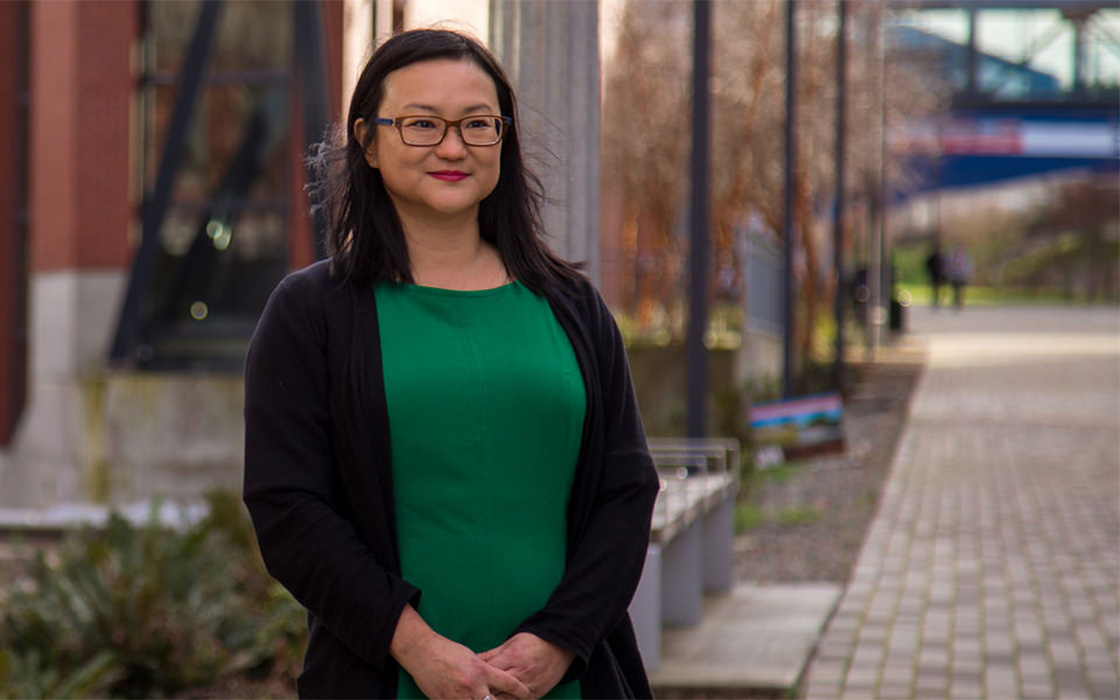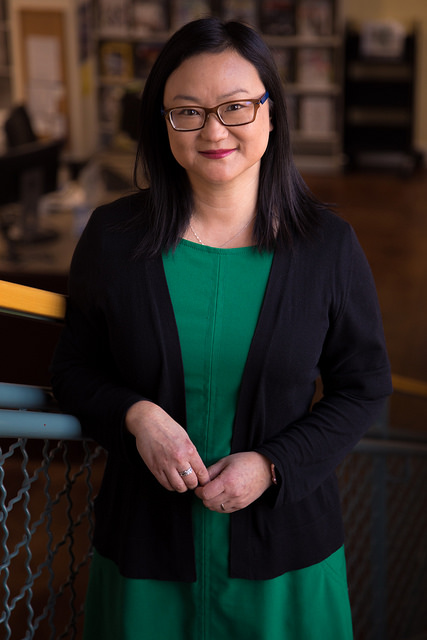
What Comes Next
Assistant Professor JaeRan Kim's research examines what happens after children are adopted and placed with new families.
This Section's arrow_downward Theme Info Is:
- Background Image: ""
- Theme: "light-theme"
- Header Style: "purple_dominant"
- Card Height Setting: "consistent_row_height"
- Section Parallax: "0"
- Section Parallax Height: ""
Doors can be both invitation and obstacle. This duality makes for a useful metaphor; one JaeRan Kim uses to talk about her life. Kim is an assistant professor in the Social Work & Criminal Justice Program at UW Tacoma. Not long ago she was, in her words, “doing all kinds of weird odd jobs and parenting two little kids.”
This was 2001. Kim lived in Minnesota. Aside from working and raising a family, she also volunteered at a social service agency. It was at this agency where Kim took the first step down her current path. “The director of volunteer services asked if I’d ever thought of being a social worker,” said Kim. “I didn’t really know what social work was so I decided to check it out.”
Kim began taking classes at Metropolitan State University in St. Paul. “I didn’t start working on my bachelor’s degree until I was in my early thirties,” she said. Within social work, Kim chose to focus on child welfare. “I had a really influential professor who had done a lot of work in adoption and that spoke to me,” she said. Kim was adopted at age three and brought to the United States from South Korea.
Kim graduated from Metropolitan State in 2005. A year later she earned her master’s degree in social work from the University of Minnesota. Kim spent the next few years working within the child welfare system. “I was really curious to find out how the adoption process in this country works and I was very intentional about what experiences I’d need in order to understand this issue from every level,” she said.
The answers Kim found sparked new questions. “I was looking for the evidence behind why we approached the work the way that we did,” she said. “I felt there was a lot missing.” A desire to fill in the information gaps lead Kim to pursue a Ph.D. from the University of Minnesota. She earned her doctorate in the spring of 2015 before moving to UW Tacoma later that same year.
"Most of the research on adoption tends to focus on adoptive parents and children but not on the lifespan of an adopted person," JaeRan Kim.

-- Dr. JaeRan Kim.
Kim teaches classes on a range of subjects within the social work program at UW Tacoma. Her research focuses on what she calls post-placement stability. “I’m really interested in what happens to children when they are no longer able to live with their families of origin and are placed with other families,” she said. “We often hear that it’s all perfect or we hear really bad horror stories but the truth is that it’s much more complicated.”
One aspect of Kim’s research looks at why parents of children adopted from other countries decide they can no longer be caregivers. Children in this scenario can end up in group homes, treatment centers, foster care or may even be adopted by another family. “We use this euphemism of forever home or permanency in child welfare but not all the families are forever homes for these kids,” said Kim. “If you can imagine a kid who’s already lost one family losing another one after that, how traumatic that can be. I want to see less of that; I want those family relationships to be really strong.”
Kim spoke with 19 parents who decided they could no longer care for an adopted child. The most common response she heard came down to a lack of information. Parents were often given an incomplete picture about a child’s health. “These kids came and they had a lot of special needs and the parents weren’t prepared and didn’t have the resources they needed,” she said.
Kim points to a lack of regulations governing intercountry adoptions as a reason why details about an adopted child can slip through the cracks. “There are fewer checks,” she said. “You’re depending on an agency in that other country to do a full family history, social history and to document all medical issues.”
The second phase of Kim’s project centers on hearing from the other side, adopted children who were sent to live elsewhere. “This is a very tough population to get hold of. Most of the people who had these experiences don’t want to talk about it,” said Kim. Despite the challenges, Kim is making progress and hopes to report her findings within the next year.
Kim is also working with the University of Minnesota’s Richard M. Lee along with UM graduate student Xiang Zhou and research assistant Heewon Lee on a study involving racial identity and cultural socialization. Kim and Lee are speaking with Korean-born adoptees who were raised in the United States by white parents. The 52 study participants are now parents themselves. “We want to know if there’s a difference between how these parents raise their children in terms of racial identity and cultural socialization when they weren’t raised in that environment and may not have knowledge of Korean culture,” said Kim.
The early findings hint at an underlying complexity that, to date, hasn’t been fully explored. The people Kim and the Minnesota research team spoke with grew up in a protective environment surrounded by family and friends who viewed them as white. “When they stepped out of that circle they weren’t white, they were Asian,” said Kim. “They faced ridicule from others that often included racial slurs.” Study respondents told Kim that when they told their adopted parents about the abuse it was often minimized. Kim stresses this doesn’t mean the parents didn’t care. “They just didn’t see their kids as Asian and couldn’t understand why anyone would make comments about their race,” she said. This perception created awkward and sometimes troubling situations. “Some participants reported family members would make derogatory remarks about another racial group in front of them because they didn’t seem them as Asian,” said Kim.
Kim and the team at the University of Minnesota hope to better understand how these adoptees transfer their ideas about race and culture to their children. What they have found so far is a reliance on what Kim calls “folk culture.” “The responses are mixed,” she said. “Some parents said they would wait until their children brought up the subject. Of those who were engaging in the culture most did things like eat Korean food or go to a performance of Korean art and that’s different from racial socialization which is more about how you identify as an Asian American.”
Kim wants to use her research to develop interventions that will help parents and their adopted children better connect. “With any adopted child you have to start with a base of loss and trauma,” she said. ‘We need to make sure we have the right kind of services to help those families.”
In many ways college is about opening doors: to new knowledge, to new experiences and to new opportunities. JaeRan Kim thinks of it this way. “Before I found social work it felt like I had to work really hard to get a door to open. Now, it’s like there are open doors in front of me and all I have to do is walk through.”
Recent news
Main Content
Gathering Strength
News Tags on this arrow_upward Story:
- None
Main Content
UW Tacoma Enrollment up 4% for Autumn 2024
News Tags on this arrow_upward Story:
- None
Main Content
Celebrating First Gen
News Tags on this arrow_upward Story:
- None



